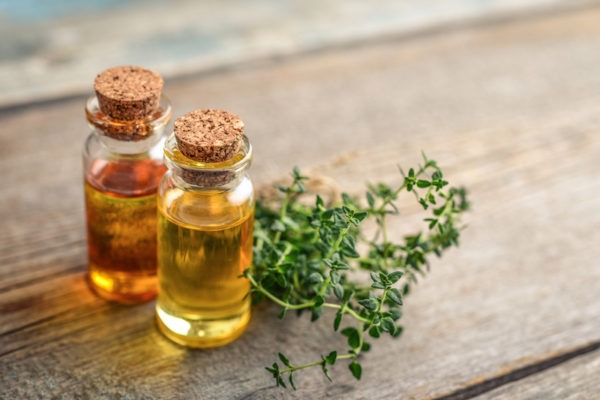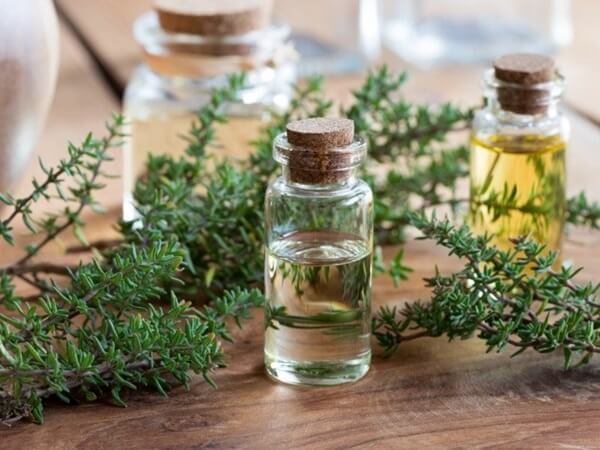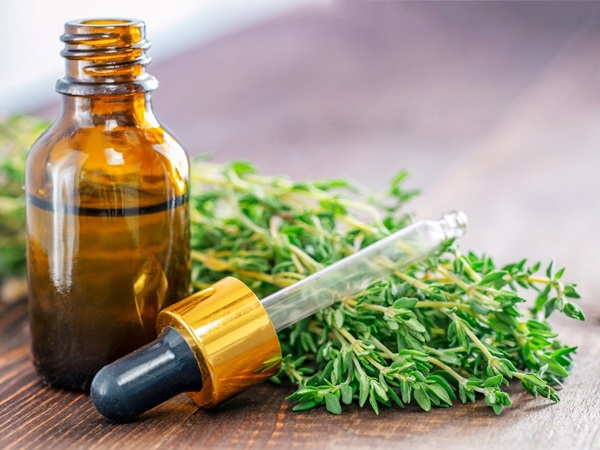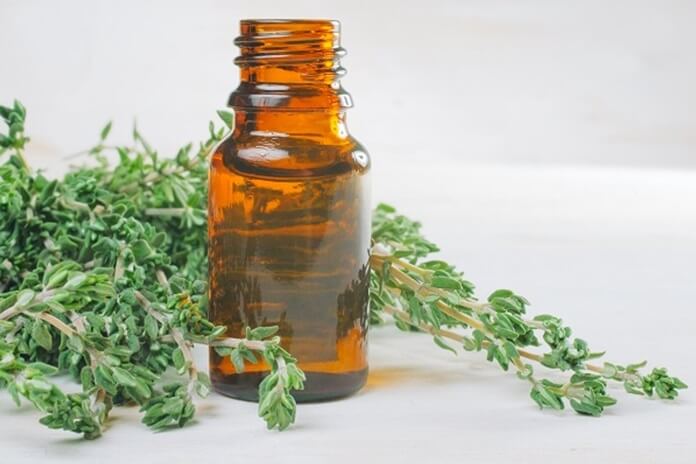Thyme is a traditional herb from the mint family, is widely used in cooking for its distinct flavor, and is also valued for its many health benefits. The herb, known scientifically as Thymus vulgaris, originates from Western Asia and Southern Europe.
It is also known by many names such as Common Thyme, Garden Thyme, French Thyme, Spanish Thyme, Tomillo, Van Ajwayan, and Vanya Yavani. Ayurveda, Siddha, and Chinese medicine practitioners recommend it for treating various respiratory issues like whooping cough, bronchitis, and sore throat, as well as stomach pain, gastritis, diarrhea, and skin problems.
More Description of Thyme Essential Oil
The name ‘thyme’ comes from the Latin word ‘thymus’, which itself is derived from the Greek word ‘thumus,’ meaning ‘smoke,’ due to its strong aroma.
Thousands of years ago, the ancient Greeks and Romans burned thyme as incense in temples, homes, and holy places to ward off bacteria and microbes in the air.
Thyme was known as a healer and protector. Its oil was used to protect against poisoning, aid digestion, and treat coughs and colds.

Ancient Egyptians even used thyme oil to embalm mummies, believing its scent helped them in the afterlife. Eventually, thyme became known worldwide as a herb with many culinary and medicinal uses.
Thyme comes in four varieties such as common thyme, red creeping thyme, caraway thyme, and lemon thyme. Its active ingredients, essential oils, and medicinal properties have made thyme-based herbal products popular for treating various health issues.
What are The Health Benefits Of Thyme Based Products?
Enhances Skin Health
Thyme essential oil and skincare products containing this herb are rich in Vitamin C and antioxidants. They work as a natural remedy for various skin issues, including acne, pimples, rashes, cuts, and scars. Thyme also helps prevent sun damage, treats signs of aging like wrinkles and fine lines, and promotes healthy, glowing skin.
To fight acne, apply a cotton ball with a drop of thyme oil mixed with tea tree oil to the affected areas on your face.
Aids in Digestion
Thyme products have antispasmodic properties that help reduce stomach gas and support gastric enzymes, improving digestion and relieving issues like flatulence, abdominal pain, diarrhea, and irritable bowel syndrome. The volatile oils in thyme also help ease abdominal cramps and prevent constipation.
To boost gut health, take a spoonful of crushed thyme leaf powder mixed with warm water first thing in the morning.
Treats respiratory Problems
Thyme essential oil is rich in anti-bacterial and expectorant properties, making it an effective remedy for various respiratory issues. It helps clear mucus and phlegm from the nasal passages, relieving chest congestion and soothing a dry, irritated throat. It’s also beneficial for treating asthma, bronchitis, sinus headaches, and pharyngitis.
To relieve a sore throat, gargle with warm water mixed with thyme essential oil for instant relief from cough and congestion.
Also read, Discover the Top 11 Healthiest Berries and Their Amazing Benefits
Promotes Heart Health
Recent research indicates that the essential oils in thyme have a relaxing effect on veins and arteries. Crushed thyme leaves or thyme powder can help dilate blood vessels, reducing heart rate and blood flow. Thyme also lowers cholesterol and prevents debris buildup in capillaries, reducing the risk of atherosclerosis, heart attacks, and heart blocks.

Wards Off Bugs
Insects and bugs can cause various problems, such as spreading viruses, bacteria, and microbes that lead to food poisoning, allergic reactions, or even serious diseases like dengue, malaria, and yellow fever. Thanks to its powerful anti-bacterial properties, patchouli essential oil is often used to repel and kill insects like mosquitoes, house flies, ants, and fleas.
Relaxes the Mind
Patchouli essential oil is rich in adaptogenic and sedative properties, which help improve mood and relieve stress. It balances the stress hormone serotonin, reducing anxiety symptoms like restlessness and cold extremities, and promotes a fresh, happy feeling.
Oral Health Benefits
Thyme oil’s strong anti-inflammatory and antibacterial properties make it great for oral health. Used in many dental products, thyme contains compounds like caryophyllene and camphene that fight bacteria, treat cavities and dental infections, and help with bad breath, plaque, and tooth decay. Thyme infusions can also be used as a mouthwash for overall dental care.
Improves Vision
Thyme is rich in Vitamin A, which supports sharp and clear vision. Its carotenoids help maintain healthy mucus membranes, and drinking thyme tea is recommended for treating dry eyes.
Combats Headaches and Muscle Cramps
Thyme is known for its anti-inflammatory properties. Applying thyme oil to your forehead can help relieve mild to severe headaches, and drinking thyme tea can soothe abdominal cramps during menstruation and alleviate PMS symptoms.

Aids Bone Health
Thyme is a great source of Vitamin K, iron, manganese, and calcium, all of which are important for maintaining bone density and reducing the risk of osteoporosis.
Boosts Hair Health
Thyme essential oil is a key ingredient in many hair care products. Pakced with beneficial nutrients, thyme-based shampoos and hair serums support hair growth, treat, dandruff and lice, and prevent hair loss. Its anti-bacterial properties also help prevent itching from scalp infections.
Boosts Immunity
Thyme essential oil is rich in antioxidants and bioactive components, making it a popular natural remedy for strengthening the immune system and fighting off infections. Its strong anti-bacterial, anti-viral, and antifungal properties help prevent illnesses such as fever, the common cold, sore throat, and other respiratory issues.

Relieving Pain and Discomfort
Thyme essential oil’s analgesic properties can help alleviate pain and discomfort. It can be used topically to soothe sore muscles, joint pain, and headaches. Diluting thyme essential oil with carrier oil and massaging it onto the affected area can provide relief from pain and promote relaxation. Additionally, thyme essential oil can be added to a warm bath for a soothing and therapeutic experience.
Conclusion
In conclusion, thyme, with its rich historical significance and diverse applications, stands out as a remarkable herb with a plethora of health benefits. From its ancient use in temples and mummification to its modern applications in skincare, digestion, and respiratory health, thyme proves to be more than just a culinary ingredient.
Its essential oils, packed with antioxidants, anti-inflammatory, and antimicrobial properties, offer effective remedies for a range of ailments. Whether used to enhance skin health, aid digestion, or boost immunity, thyme’s versatility and efficacy make it a valuable addition to both our kitchens and medicine cabinets. Embracing thyme’s benefits can lead to a healthier lifestyle, supporting everything from heart health to hair care and beyond.
You may also like to read, Nutrition Facts on Costco Rotisserie Chicken and How much does it cost?
Frequently Ask Question
What is thyme essential oil and how is it made?
Thyme essential oil is a concentrated liquid extracted from the leaves and flowers of the thyme plant (Thymus vulgaris). The extraction process typically involves steam distillation, where steam passes through the plant material to release the essential oil. The steam is then condensed back into a liquid, separating the essential oil from the water.
Can thyme essential oil be ingested?
Ingesting thyme essential oil is generally not recommended without the supervision of a qualified healthcare professional. While thyme essential oil has internal uses in some traditional medicine practices, it is highly concentrated and can cause adverse effects if not used correctly.
